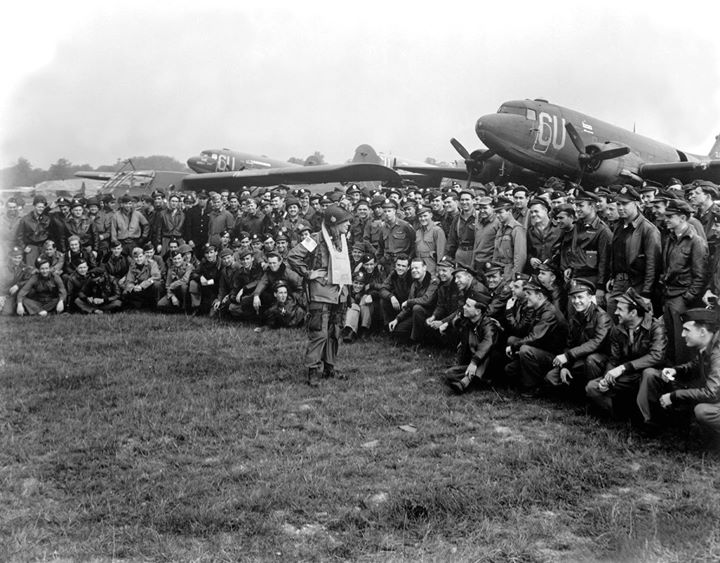“December 22nd, 1944
To the U.S.A. Commander of the encircled town of Bastogne.
The fortune of war is changing. This time the U.S.A. forces in and near Bastogne have been encircled by strong German armored units. More German armored units have crossed the river Ourthe near Ortheuville, have taken Marche and reached St. Hubert by passing through Hompre-Sibret-Tillet. Libramont is in German hands.
There is only one possibility to save the encircled U.S.A troops from total annihilation: that is the honorable surrender of the encircled town. In order to think it over a term of two hours will be granted beginning with the presentation of this note.
If this proposal should be rejected one German Artillery Corps and six heavy A. A. Battalions are ready to annihilate the U.S.A. troops in and near Bastogne. The order for firing will be given immediately after this two-hour term.
All the serious civilian losses caused by this artillery fire would not correspond with the well-known American humanity.
The German Commander.”
Learning of the developing situation, the Acting Chief of Staff, Lt. Col. Ned Moore, entered B.G. Anthony C. McAuliffe’s sleeping quarters adjacent to the communications center. Moore wakened McAulliffe and told him, “The Germans have sent some people forward to take our surrender.”
“They want to surrender?” McAuliffe asked, still groggy from sleep. An aide replied, “no, sir, they want us to surrender.” McAuliffe rose, and dropping the sheets to the floor replied with the now-famous… “Aw nuts.”
Moore then informed the rest of the staff of the German surrender demand and of McAuliffe’s response. McAuliffe left to congratulate a group of soldiers who had destroyed a German roadblock. When he returned, he received a phone call informing him that the two German officers were still waiting for an answer.
“Well, I don’t know what to tell them,” he said. At that point, LTC Harry Kinnard, the Division’s Operations Officer said, “Sir, what you said initially would be hard to beat.” McAulliffe asked, “What do you mean?” and Kinnard replied, “Sir, you said ‘nuts.'” All members of the staff agreed, so McAulliffe wrote it down on a message pad and said, “Have it typed up.”
“December 22, 1944
To the German Commander,
N U T S!
The American Commander”
McAuliffe’s written reply was delivered back down to the command post where the blindfolded German officers awaited their answer. Asking if it was written or verbal, the German officer was told the message was written. He was told that it consisted of a single word, “Nuts!” Unaware of American slang, the German officer was confused. “Is that reply negative or affirmative?” The Americans said, “The reply is decidedly not affirmative.”
The Germans, after returning to the front lines, were still confused and again asked what the reply meant. An American soldier who spoke German said, “Du kannst zum Teufel gehen” (“you can go to Hell.”) Then the officer present said to the Germans, “If you continue to attack, we will kill every goddamn German that tries to break into this city.”
Henke replied, “We will kill many Americans. This is war.” The American officer Major Harper then said, “On your way, Bud,” and without thinking, added, “and good luck to you.” The Germans saluted and started to walk away. Harper angrily called out to them, “If you don’t know what I am talking about, simply go back to your commanding officer and tell him to just plain ‘Go to Hell.'”
[youtube https://www.youtube.com/watch?v=5LXCnsBo8Vs]
The Germans continued to pressure Bastogne, but their window of opportunity had passed. Soon afterward, the skies cleared and the Allied mastery of the air showed once and for all that the gamble was going to be a costly one for the German Army. American fighters and bombers began ripping into German armored formations, while C-47s began airdropping supplies and ammunition to the men of the 101st.
On the afternoon of December 26th, the first tanks of the 37th Tank Battalion, 4th Armored Division of the Third Army under General Patton broke through the German encirclement. They opened a tenuous lifeline through which the most seriously wounded paratroopers could be evacuated. The American lines were restored and the 101st was no longer encircled. Getting back the terrain lost took another month. As the Third Army widened the lifeline into Bastogne, General Patton awarded McAuliffe the Distinguished Service Cross.
The German counterattack at the Western front had failed at a tremendous cost. All three German reserve armor divisions had been smashed and there were no more to replace them. With the Russians pushing from the east and the Western Allies squeezing them from the west the Nazis were finished.
McAuliffe earned his second star on January 14, 1945, and was given command of the 103rd Infantry Division. They fought across the Rhine Valley, and in April 1945, the division took Landsberg, and they liberated the Kaufering concentration camp, a sub-camp of Dachau.
McAuliffe and the 103rd crossed the Danube River near Ulm on April 26. On May 3, 1945, the 103rd captured Innsbruck in Austria, with little to no fighting. It then seized the Brenner Pass and met with the 88th Infantry Division of the U.S. Fifth Army at Vipiteno, Italy, thereby joining the Italian and Western European fronts. The war in Europe was over.
McAuliffe would continue to rise in the post-war years serving as the Chief Chemical Officer of the Army Chemical Corps, and G-1, Head of Army Personnel. He returned to Europe as Commander of the Seventh Army in 1953, and then became Commander-in-Chief of the United States Army Europe in 1955, earning his fourth star.
He retired from the Army in 1956 and worked in the private sector until 1963, retiring for good in Chevy Chase, MD. McAuliffe died from leukemia at Walter Reed Army Hospital on August 11, 1975, and was buried in Arlington National Cemetery.










COMMENTS